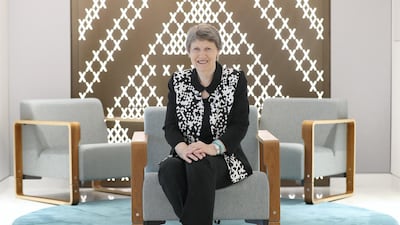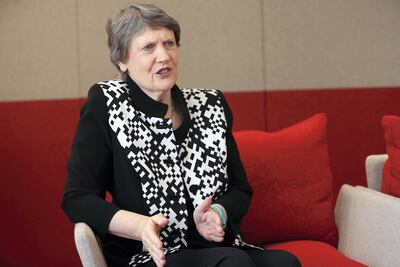Former New Zealand prime minister Helen Clark is unequivocal when challenged on the pervading doom and gloom about the world. Can she really remain an optimist? "Of course," she said enthusiastically, when we met last month in Abu Dhabi, where she was taking part in the Reaching The Last Mile conference. "We are making real progress. But change only happens when people come together to work for it. What we need is to renew that spirit of global co-operation."
But is that possible in the era of US President Donald Trump, when the global architecture is being disrupted from within and without? Clark, who released her book Women, Equality, Power in 2018, recognises the context is much harder. "President Obama got it," she says. "He acknowledged that the US couldn't go it alone, that we needed to work in partnership."
Campaigners need to be more creative in forming agile coalitions over issues that motivate them, she adds. "And remember that the pendulum swings, presidents come and go and progress zig-zags."

Clark, the head of the UN development programme, cites moments when people came together to push for change, such as the surge in climate activism over the past year and the successful conference in Abu Dhabi that focused on neglected tropical diseases. "China is now stepping up on the [UN's] sustainable development goals. And the US will be back," she continues.
When it is suggested that climate change is simply the latest example of where her generation of leaders has failed, Clark pushes back. She emphasises pioneering legislation passed in New Zealand on her watch, such as in 2002 when her country ratified the Kyoto Protocol, a binding agreement to reduce greenhouse emissions. But she also acknowledges the failures of political leadership and says only public pressure can force the conditions for change.
"Eight of the hottest years were in the past 10 years," she says. "Look at the catastrophic fires in Australia. This is truly terrifying. Ultimately, activists need to engage with the policy process. The road is long, but we all know what we need to do. And many of we boomers [people born between 1946 and 1964] have tried."

Clark has achieved many things in her career, but, despite public support for her to be appointed UN Secretary General in 2017, she was pipped at the post by Portuguese politician Antonio Guterres. While she would surely be doing the job differently, perhaps speaking out against the drift towards autocracy in parts of the world, when asked about his leadership Clark – ever the diplomat – stresses the political values she has shared with Guterres and praises his efforts on peacemaking and climate concerns.
"People lament the state of multilateralism," she says. "Maybe we are in survival mode. As UNSG, you need a working relationship with the US, especially given their financial contribution. But you need red lines on which issues and values have to be fought for. If the UN won't stand up for these freedoms, who will?"
A career well travelled
Despite the disappointment of missing out on the role, Clark, 69, remains active and regularly travels for her work. She made two trips to the UAE late last year, with a visit to Kenya in between. "The reality of New Zealand's location is that you have no choice," she says. "I'm just relieved that we negotiated the Emirates airline connection when we did."
Clearly the stamina she developed as prime minister means she is able to cram in more events than most people, while retaining a genuine enjoyment of the human connection. After a panel at the Dubai Future Academy in November, she stayed behind for an hour, talking to everyone who wanted to continue the conversation.
'We haven't got a hope'
So what keeps her awake at night? Clark worries that world trade is increasingly lawless and that we are already off-track to meet the UN's sustainable development goals, saying there is little sign the collective will make up the ground. "If it is business as usual, we haven't got a hope," she says. "We need much more political leadership. The reality is that we made a series of ambitious commitments to the world's poorest, to eradicate extreme poverty by 2030. We talk about halving maternal mortality, but that still leaves half. We can't simply duck these commitments, or decide that they are too difficult. As more of the world comes online, they will rightly hold us to account."
Clark was one of the first to realise the potential of the internet in politics. She was an early adopter of Twitter, surprising people by using her account herself and regularly replying to questions while other world leaders were simply transmitting. Social media has become her "antennae". But has social media made international relations more difficult? "No, easier," she says. "To communicate directly with the world without the filter of traditional media is a huge asset. I remember asking in late 2008: 'what's Twitter?' In 10 years it has revolutionised politics and communication for the better.
“But there are downsides. Terrorists and others use it to build communities of their own. We have to use it more effectively, more creatively than them.”
Women are the future
This belief is what led Clark to delay her departure from one recent event to hold an impromptu workshop for young female diplomats on how to create Instagram stories. Clark says it is women such as them who also fuel her optimism. She speaks candidly of the challenges of being a woman in the traditionally male-dominated environments of politics and statecraft, and how the campaign for UNSG was "the first glass ceiling I failed to break".
The role of women in grassroots mediation, however, is simply proof that the more that women are involved, the easier it will be to prevent and manage conflict, she says. As if to emphasise this point, after a speech in the UAE she happily put on a badge saying: "Who runs the world? Women run the world". "They don't yet, but the progress is unstoppable," she says. "And that will make for a more peaceful world."
Achieving world peace
Clark's contribution to future peace has been large. For example, spurred into action by mosque shootings in Christchurch last year, the Helen Clark Foundation developed a "Christchurch Call" for tolerance and coexistence. This was widely adopted by governments shocked by the attacks and aimed to find a common vehicle to reduce the polarisation of national and global debate.
Clark says she wants to use this momentum to convince governments and social media companies to take more practical steps to restrict online radicalisation. "There is no other form of media that would have broadcast live 29 horrific minutes of the massacre in Christchurch, in the way that Facebook did," she says. "This cannot be acceptable. We need new codes of conduct and self regulation, with sanctions for those platforms that do not respect them. And we need some kind of global agreement – this is a new and urgent front line for statecraft."
As the travelling and tweets, conferences and challenges, continue to add up, Clark shows no sign of slowing down – but her family keeps her grounded. "New Zealanders tend to be quickly corrected if they don't keep their feet on the ground," she says.
Being an advocate of global citizenship, the international system and a collective effort to reduce global poverty may be a lonelier place than it once was, but if the world were forming a haka to fight back, Clark would be in the midst of it. And she wants to enlist tomorrow's leaders. "These global challenges will continue to grow and evolve. You have to play your part. Don't wait to be asked."
Tom Fletcher is a former ambassador, an author and the founder of The Foundation of Opportunity



